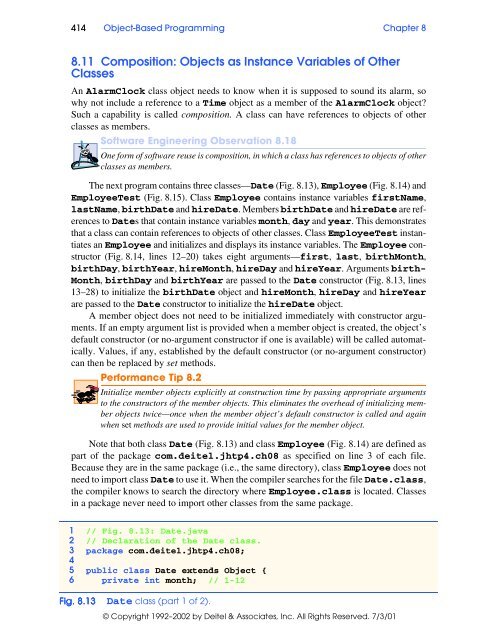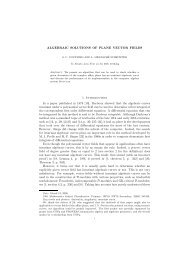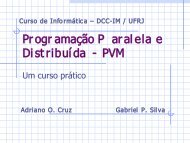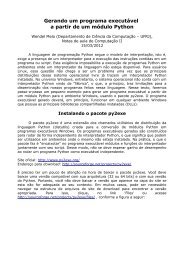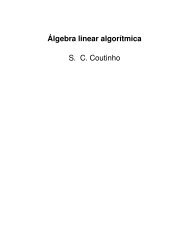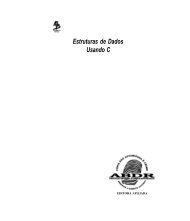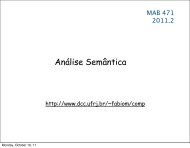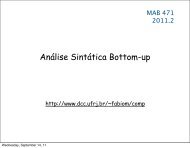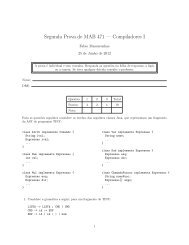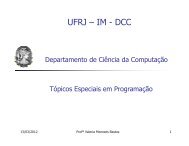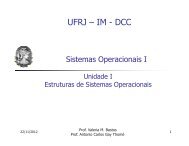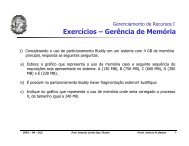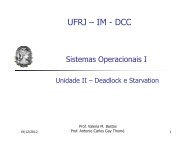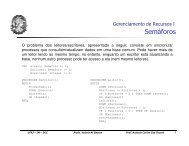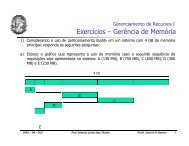- Page 1 and 2:
Contents Preface xxxv 1 Introductio
- Page 3 and 4:
Contents IX 5 Control Structures: P
- Page 5 and 6:
Contents XI 9.15 Polymorphism Examp
- Page 7 and 8:
Contents XIII 13.15 GridBagLayout L
- Page 9 and 10:
Contents XV 20 Java Utilities Packa
- Page 11 and 12:
Contents XVII H.6 Class ElevatorSha
- Page 13 and 14:
Live in fragments no longer. Only c
- Page 15 and 16:
Appendix Preface XXXVII a carefully
- Page 17 and 18:
Appendix Preface XXXIX Some Notes t
- Page 19 and 20:
Appendix Preface XLI sist on three-
- Page 21 and 22:
Appendix Preface XLIII 46 Testing a
- Page 23 and 24:
Appendix Preface XLV also were able
- Page 25 and 26:
Appendix Preface XLVII tions; Entit
- Page 27 and 28:
Appendix Preface XLIX extraordinary
- Page 29 and 30:
Appendix Preface LI Boston Universi
- Page 31 and 32:
Objectives 1 Introduction to Comput
- Page 33 and 34:
Chapter 1 Introduction to Computers
- Page 35 and 36:
Chapter 1 Introduction to Computers
- Page 37 and 38:
Chapter 1 Introduction to Computers
- Page 39 and 40:
Chapter 1 Introduction to Computers
- Page 41 and 42:
Chapter 1 Introduction to Computers
- Page 43 and 44:
Chapter 1 Introduction to Computers
- Page 45 and 46:
Chapter 1 Introduction to Computers
- Page 47 and 48:
Chapter 1 Introduction to Computers
- Page 49 and 50:
Chapter 1 Introduction to Computers
- Page 51 and 52:
Chapter 1 Introduction to Computers
- Page 53 and 54:
Chapter 1 Introduction to Computers
- Page 55 and 56:
Chapter 1 Introduction to Computers
- Page 57 and 58:
Chapter 1 Introduction to Computers
- Page 59 and 60:
Chapter 1 Introduction to Computers
- Page 61 and 62:
Chapter 1 Introduction to Computers
- Page 63 and 64:
Chapter 1 Introduction to Computers
- Page 65 and 66:
Chapter 1 Introduction to Computers
- Page 67 and 68:
Chapter 1 Introduction to Computers
- Page 69 and 70:
Chapter 1 Introduction to Computers
- Page 71 and 72:
Chapter 1 Introduction to Computers
- Page 73 and 74:
Chapter 1 Introduction to Computers
- Page 75 and 76:
Chapter 1 Introduction to Computers
- Page 77 and 78:
Chapter 1 Introduction to Computers
- Page 79 and 80:
Chapter 1 Introduction to Computers
- Page 81 and 82:
Chapter 1 Introduction to Computers
- Page 83 and 84:
Chapter 1 Introduction to Computers
- Page 85 and 86:
Objectives 2 Introduction to Java A
- Page 87 and 88:
Chapter 2 Introduction to Java Appl
- Page 89 and 90:
Chapter 2 Introduction to Java Appl
- Page 91 and 92:
Chapter 2 Introduction to Java Appl
- Page 93 and 94:
Chapter 2 Introduction to Java Appl
- Page 95 and 96:
Chapter 2 Introduction to Java Appl
- Page 97 and 98:
Chapter 2 Introduction to Java Appl
- Page 99 and 100:
Chapter 2 Introduction to Java Appl
- Page 101 and 102:
Chapter 2 Introduction to Java Appl
- Page 103 and 104:
Chapter 2 Introduction to Java Appl
- Page 105 and 106:
Chapter 2 Introduction to Java Appl
- Page 107 and 108:
Chapter 2 Introduction to Java Appl
- Page 109 and 110:
Chapter 2 Introduction to Java Appl
- Page 111 and 112:
Chapter 2 Introduction to Java Appl
- Page 113 and 114:
Chapter 2 Introduction to Java Appl
- Page 115 and 116:
Chapter 2 Introduction to Java Appl
- Page 117 and 118:
Chapter 2 Introduction to Java Appl
- Page 119 and 120:
Chapter 2 Introduction to Java Appl
- Page 121 and 122:
Chapter 2 Introduction to Java Appl
- Page 123 and 124:
Chapter 2 Introduction to Java Appl
- Page 125 and 126:
Chapter 2 Introduction to Java Appl
- Page 127 and 128:
Chapter 2 Introduction to Java Appl
- Page 129 and 130:
Chapter 2 Introduction to Java Appl
- Page 131 and 132:
Chapter 2 Introduction to Java Appl
- Page 133 and 134:
Chapter 2 Introduction to Java Appl
- Page 135 and 136:
Objectives 3 Introduction to Java A
- Page 137 and 138:
Chapter 3 Introduction to Java Appl
- Page 139 and 140:
Chapter 3 Introduction to Java Appl
- Page 141 and 142:
Chapter 3 Introduction to Java Appl
- Page 143 and 144:
Chapter 3 Introduction to Java Appl
- Page 145 and 146:
Chapter 3 Introduction to Java Appl
- Page 147 and 148:
Chapter 3 Introduction to Java Appl
- Page 149 and 150:
Chapter 3 Introduction to Java Appl
- Page 151 and 152:
Chapter 3 Introduction to Java Appl
- Page 153 and 154:
Chapter 3 Introduction to Java Appl
- Page 155 and 156:
Chapter 3 Introduction to Java Appl
- Page 157 and 158:
Chapter 3 Introduction to Java Appl
- Page 159 and 160:
Chapter 3 Introduction to Java Appl
- Page 161 and 162:
Chapter 3 Introduction to Java Appl
- Page 163 and 164:
Chapter 3 Introduction to Java Appl
- Page 165 and 166:
Chapter 3 Introduction to Java Appl
- Page 167 and 168:
Chapter 3 Introduction to Java Appl
- Page 169 and 170:
Chapter 3 Introduction to Java Appl
- Page 171 and 172:
Chapter 3 Introduction to Java Appl
- Page 173 and 174:
Chapter 3 Introduction to Java Appl
- Page 175 and 176:
Chapter 3 Introduction to Java Appl
- Page 177 and 178:
Chapter 3 Introduction to Java Appl
- Page 179 and 180:
Chapter 4 Control Structures: Part
- Page 181 and 182:
Chapter 4 Control Structures: Part
- Page 183 and 184:
Chapter 4 Control Structures: Part
- Page 185 and 186:
Chapter 4 Control Structures: Part
- Page 187 and 188:
Chapter 4 Control Structures: Part
- Page 189 and 190:
Chapter 4 Control Structures: Part
- Page 191 and 192:
Chapter 4 Control Structures: Part
- Page 193 and 194:
Chapter 4 Control Structures: Part
- Page 195 and 196:
Chapter 4 Control Structures: Part
- Page 197 and 198:
Chapter 4 Control Structures: Part
- Page 199 and 200:
Chapter 4 Control Structures: Part
- Page 201 and 202:
Chapter 4 Control Structures: Part
- Page 203 and 204:
Chapter 4 Control Structures: Part
- Page 205 and 206:
Chapter 4 Control Structures: Part
- Page 207 and 208:
Chapter 4 Control Structures: Part
- Page 209 and 210:
Chapter 4 Control Structures: Part
- Page 211 and 212:
Chapter 4 Control Structures: Part
- Page 213 and 214:
Chapter 4 Control Structures: Part
- Page 215 and 216:
Chapter 4 Control Structures: Part
- Page 217 and 218:
Chapter 4 Control Structures: Part
- Page 219 and 220:
Chapter 4 Control Structures: Part
- Page 221 and 222:
Chapter 4 Control Structures: Part
- Page 223 and 224:
Chapter 4 Control Structures: Part
- Page 225 and 226:
Chapter 4 Control Structures: Part
- Page 227 and 228:
Objectives 5 Control Structures: Pa
- Page 229 and 230:
Chapter 5 Control Structures: Part
- Page 231 and 232:
Chapter 5 Control Structures: Part
- Page 233 and 234:
Chapter 5 Control Structures: Part
- Page 235 and 236:
Chapter 5 Control Structures: Part
- Page 237 and 238:
Chapter 5 Control Structures: Part
- Page 239 and 240:
Chapter 5 Control Structures: Part
- Page 241 and 242:
Chapter 5 Control Structures: Part
- Page 243 and 244:
Chapter 5 Control Structures: Part
- Page 245 and 246:
Chapter 5 Control Structures: Part
- Page 247 and 248:
Chapter 5 Control Structures: Part
- Page 249 and 250:
Chapter 5 Control Structures: Part
- Page 251 and 252:
Chapter 5 Control Structures: Part
- Page 253 and 254:
Chapter 5 Control Structures: Part
- Page 255 and 256:
Chapter 5 Control Structures: Part
- Page 257 and 258:
Chapter 5 Control Structures: Part
- Page 259 and 260:
Chapter 5 Control Structures: Part
- Page 261 and 262:
Chapter 5 Control Structures: Part
- Page 263 and 264:
Chapter 5 Control Structures: Part
- Page 265 and 266:
Chapter 5 Control Structures: Part
- Page 267 and 268:
Chapter 5 Control Structures: Part
- Page 269 and 270:
Chapter 5 Control Structures: Part
- Page 271 and 272:
Chapter 5 Control Structures: Part
- Page 273 and 274:
Chapter 5 Control Structures: Part
- Page 275 and 276:
Chapter 5 Control Structures: Part
- Page 277 and 278:
Chapter 6 Methods 247 Outline 6.1 I
- Page 279 and 280:
Chapter 6 Methods 249 6.3 Math Clas
- Page 281 and 282:
Chapter 6 Methods 251 Software Engi
- Page 283 and 284:
Chapter 6 Methods 253 43 // square
- Page 285 and 286:
Chapter 6 Methods 255 (such as g.dr
- Page 287 and 288:
Chapter 6 Methods 257 34 // display
- Page 289 and 290:
Chapter 6 Methods 259 Converting va
- Page 291 and 292:
Chapter 6 Methods 261 6.8 Random-Nu
- Page 293 and 294:
Chapter 6 Methods 263 To show that
- Page 295 and 296:
Chapter 6 Methods 265 which always
- Page 297 and 298:
Chapter 6 Methods 267 75 76 switch
- Page 299 and 300:
Chapter 6 Methods 269 Fig. Fig. 6.9
- Page 301 and 302:
Chapter 6 Methods 271 screen. Norma
- Page 303 and 304:
Chapter 6 Methods 273 parameter lis
- Page 305 and 306:
Chapter 6 Methods 275 6.11 Scope Ru
- Page 307 and 308:
Chapter 6 Methods 277 54 55 // useI
- Page 309 and 310:
Chapter 6 Methods 279 A recursive d
- Page 311 and 312:
Chapter 6 Methods 281 factorial met
- Page 313 and 314:
Chapter 6 Methods 283 40 // create
- Page 315 and 316:
Chapter 6 Methods 285 Figure 6.14 s
- Page 317 and 318:
Chapter 6 Methods 287 memory space.
- Page 319 and 320:
Chapter 6 Methods 289 1 // Fig. 6.1
- Page 321 and 322:
Chapter 6 Methods 291 8 public clas
- Page 323 and 324:
Chapter 6 Methods 293 obtains the G
- Page 325 and 326:
Chapter 6 Methods 295 From the “r
- Page 327 and 328:
Chapter 6 Methods 297 • An import
- Page 329 and 330:
Chapter 6 Methods 299 • The apple
- Page 331 and 332:
Chapter 6 Methods 301 7 8 for ( x =
- Page 333 and 334:
Chapter 6 Methods 303 39 System.out
- Page 335 and 336:
Chapter 6 Methods 305 EXERCISES 6.7
- Page 337 and 338:
Chapter 6 Methods 307 6.16 Write a
- Page 339 and 340:
Chapter 6 Methods 309 6.28 The grea
- Page 341 and 342:
Chapter 6 Methods 311 Fig. Fig. 6.2
- Page 343 and 344:
Objectives 7 Arrays • To introduc
- Page 345 and 346:
Chapter 7 Arrays 315 7.2 Arrays An
- Page 347 and 348:
Chapter 7 Arrays 317 7.3 Declaring
- Page 349 and 350:
Chapter 7 Arrays 319 25 JOptionPane
- Page 351 and 352:
Chapter 7 Arrays 321 1 // Fig. 7.5:
- Page 353 and 354:
Chapter 7 Arrays 323 15 // add each
- Page 355 and 356:
Chapter 7 Arrays 325 7 public class
- Page 357 and 358:
Chapter 7 Arrays 327 18 // for each
- Page 359 and 360:
Chapter 7 Arrays 329 7.5 References
- Page 361 and 362:
Chapter 7 Arrays 331 10 public clas
- Page 363 and 364:
Chapter 7 Arrays 333 are equal), th
- Page 365 and 366:
Chapter 7 Arrays 335 array2[ 9 ]. O
- Page 367 and 368:
Chapter 7 Arrays 337 45 46 for ( in
- Page 369 and 370:
Chapter 7 Arrays 339 8 9 // Java ex
- Page 371 and 372:
Chapter 7 Arrays 341 113 114 return
- Page 373 and 374:
Chapter 7 Arrays 343 7.9 Multiple-S
- Page 375 and 376:
Chapter 7 Arrays 345 25 26 outputAr
- Page 377 and 378:
Chapter 7 Arrays 347 execution of t
- Page 379 and 380:
Chapter 7 Arrays 349 101 // return
- Page 381 and 382:
Chapter 7 Arrays 351 Class Verb phr
- Page 383 and 384:
Chapter 7 Arrays 353 may not send a
- Page 385 and 386:
Chapter 7 Arrays 355 • To pass an
- Page 387 and 388:
Chapter 7 Arrays 357 7.5 Find the e
- Page 389 and 390:
Chapter 7 Arrays 359 that week. For
- Page 391 and 392:
Chapter 7 Arrays 361 28 else 29 ret
- Page 393 and 394: Chapter 7 Arrays 363 Command Meanin
- Page 395 and 396: Chapter 7 Arrays 365 Let the variab
- Page 397 and 398: Chapter 7 Arrays 367 * * * * * * *
- Page 399 and 400: Chapter 7 Arrays 369 a) Starting fr
- Page 401 and 402: Chapter 7 Arrays 371 Animal Move ty
- Page 403 and 404: Chapter 7 Arrays 373 Location Numbe
- Page 405 and 406: Chapter 7 Arrays 375 Code and “pi
- Page 407 and 408: Chapter 7 Arrays 377 and should pri
- Page 409 and 410: Chapter 8 Object-Based Programming
- Page 411 and 412: Chapter 8 Object-Based Programming
- Page 413 and 414: Chapter 8 Object-Based Programming
- Page 415 and 416: Chapter 8 Object-Based Programming
- Page 417 and 418: Chapter 8 Object-Based Programming
- Page 419 and 420: Chapter 8 Object-Based Programming
- Page 421 and 422: Chapter 8 Object-Based Programming
- Page 423 and 424: Chapter 8 Object-Based Programming
- Page 425 and 426: Chapter 8 Object-Based Programming
- Page 427 and 428: Chapter 8 Object-Based Programming
- Page 429 and 430: Chapter 8 Object-Based Programming
- Page 431 and 432: Chapter 8 Object-Based Programming
- Page 433 and 434: Chapter 8 Object-Based Programming
- Page 435 and 436: Chapter 8 Object-Based Programming
- Page 437 and 438: Chapter 8 Object-Based Programming
- Page 439 and 440: Chapter 8 Object-Based Programming
- Page 441 and 442: Chapter 8 Object-Based Programming
- Page 443: Chapter 8 Object-Based Programming
- Page 447 and 448: Chapter 8 Object-Based Programming
- Page 449 and 450: Chapter 8 Object-Based Programming
- Page 451 and 452: Chapter 8 Object-Based Programming
- Page 453 and 454: Chapter 8 Object-Based Programming
- Page 455 and 456: Chapter 8 Object-Based Programming
- Page 457 and 458: Chapter 8 Object-Based Programming
- Page 459 and 460: Chapter 8 Object-Based Programming
- Page 461 and 462: Chapter 8 Object-Based Programming
- Page 463 and 464: Chapter 8 Object-Based Programming
- Page 465 and 466: Chapter 8 Object-Based Programming
- Page 467 and 468: Chapter 8 Object-Based Programming
- Page 469 and 470: Chapter 8 Object-Based Programming
- Page 471 and 472: Chapter 8 Object-Based Programming
- Page 473 and 474: Chapter 8 Object-Based Programming
- Page 475 and 476: Objectives 9 Object-Oriented Progra
- Page 477 and 478: Chapter 9 Object-Oriented Programmi
- Page 479 and 480: Chapter 9 Object-Oriented Programmi
- Page 481 and 482: Chapter 9 Object-Oriented Programmi
- Page 483 and 484: Chapter 9 Object-Oriented Programmi
- Page 485 and 486: Chapter 9 Object-Oriented Programmi
- Page 487 and 488: Chapter 9 Object-Oriented Programmi
- Page 489 and 490: Chapter 9 Object-Oriented Programmi
- Page 491 and 492: Chapter 9 Object-Oriented Programmi
- Page 493 and 494: Chapter 9 Object-Oriented Programmi
- Page 495 and 496:
Chapter 9 Object-Oriented Programmi
- Page 497 and 498:
Chapter 9 Object-Oriented Programmi
- Page 499 and 500:
Chapter 9 Object-Oriented Programmi
- Page 501 and 502:
Chapter 9 Object-Oriented Programmi
- Page 503 and 504:
Chapter 9 Object-Oriented Programmi
- Page 505 and 506:
Chapter 9 Object-Oriented Programmi
- Page 507 and 508:
Chapter 9 Object-Oriented Programmi
- Page 509 and 510:
Chapter 9 Object-Oriented Programmi
- Page 511 and 512:
Chapter 9 Object-Oriented Programmi
- Page 513 and 514:
Chapter 9 Object-Oriented Programmi
- Page 515 and 516:
Chapter 9 Object-Oriented Programmi
- Page 517 and 518:
Chapter 9 Object-Oriented Programmi
- Page 519 and 520:
Chapter 9 Object-Oriented Programmi
- Page 521 and 522:
Chapter 9 Object-Oriented Programmi
- Page 523 and 524:
Chapter 9 Object-Oriented Programmi
- Page 525 and 526:
Chapter 9 Object-Oriented Programmi
- Page 527 and 528:
Chapter 9 Object-Oriented Programmi
- Page 529 and 530:
Chapter 9 Object-Oriented Programmi
- Page 531 and 532:
Chapter 9 Object-Oriented Programmi
- Page 533 and 534:
Chapter 9 Object-Oriented Programmi
- Page 535 and 536:
Chapter 9 Object-Oriented Programmi
- Page 537 and 538:
Chapter 9 Object-Oriented Programmi
- Page 539 and 540:
Chapter 9 Object-Oriented Programmi
- Page 541 and 542:
Chapter 9 Object-Oriented Programmi
- Page 543 and 544:
Chapter 9 Object-Oriented Programmi
- Page 545 and 546:
Chapter 9 Object-Oriented Programmi
- Page 547 and 548:
Chapter 9 Object-Oriented Programmi
- Page 549 and 550:
Chapter 9 Object-Oriented Programmi
- Page 551 and 552:
Chapter 9 Object-Oriented Programmi
- Page 553 and 554:
Chapter 9 Object-Oriented Programmi
- Page 555 and 556:
Chapter 9 Object-Oriented Programmi
- Page 557 and 558:
Chapter 9 Object-Oriented Programmi
- Page 559 and 560:
Chapter 9 Object-Oriented Programmi
- Page 561 and 562:
Chapter 9 Object-Oriented Programmi
- Page 563 and 564:
Chapter 9 Object-Oriented Programmi
- Page 565 and 566:
Chapter 9 Object-Oriented Programmi
- Page 567 and 568:
Chapter 10 Strings and Characters 5
- Page 569 and 570:
Chapter 10 Strings and Characters 5
- Page 571 and 572:
Chapter 10 Strings and Characters 5
- Page 573 and 574:
Chapter 10 Strings and Characters 5
- Page 575 and 576:
Chapter 10 Strings and Characters 5
- Page 577 and 578:
Chapter 10 Strings and Characters 5
- Page 579 and 580:
Chapter 10 Strings and Characters 5
- Page 581 and 582:
Chapter 10 Strings and Characters 5
- Page 583 and 584:
Chapter 10 Strings and Characters 5
- Page 585 and 586:
Chapter 10 Strings and Characters 5
- Page 587 and 588:
Chapter 10 Strings and Characters 5
- Page 589 and 590:
Chapter 10 Strings and Characters 5
- Page 591 and 592:
Chapter 10 Strings and Characters 5
- Page 593 and 594:
Chapter 10 Strings and Characters 5
- Page 595 and 596:
Chapter 10 Strings and Characters 5
- Page 597 and 598:
Chapter 10 Strings and Characters 5
- Page 599 and 600:
Chapter 10 Strings and Characters 5
- Page 601 and 602:
Chapter 10 Strings and Characters 5
- Page 603 and 604:
Chapter 10 Strings and Characters 5
- Page 605 and 606:
Chapter 10 Strings and Characters 5
- Page 607 and 608:
Chapter 10 Strings and Characters 5
- Page 609 and 610:
Chapter 10 Strings and Characters 5
- Page 611 and 612:
Chapter 10 Strings and Characters 5
- Page 613 and 614:
Chapter 10 Strings and Characters 5
- Page 615 and 616:
Chapter 10 Strings and Characters 5
- Page 617 and 618:
Chapter 10 Strings and Characters 5
- Page 619 and 620:
Chapter 10 Strings and Characters 5
- Page 621 and 622:
Chapter 10 Strings and Characters 5
- Page 623 and 624:
Chapter 10 Strings and Characters 5
- Page 625 and 626:
Chapter 10 Strings and Characters 5
- Page 627 and 628:
Chapter 10 Strings and Characters 5
- Page 629 and 630:
Chapter 10 Strings and Characters 5
- Page 631 and 632:
Objectives 11 Graphics and Java2D
- Page 633 and 634:
Chapter 11 Graphics and Java2D 603
- Page 635 and 636:
Chapter 11 Graphics and Java2D 605
- Page 637 and 638:
Chapter 11 Graphics and Java2D 607
- Page 639 and 640:
Chapter 11 Graphics and Java2D 609
- Page 641 and 642:
Chapter 11 Graphics and Java2D 611
- Page 643 and 644:
Chapter 11 Graphics and Java2D 613
- Page 645 and 646:
Chapter 11 Graphics and Java2D 615
- Page 647 and 648:
Chapter 11 Graphics and Java2D 617
- Page 649 and 650:
Chapter 11 Graphics and Java2D 619
- Page 651 and 652:
Chapter 11 Graphics and Java2D 621
- Page 653 and 654:
Chapter 11 Graphics and Java2D 623
- Page 655 and 656:
Chapter 11 Graphics and Java2D 625
- Page 657 and 658:
Chapter 11 Graphics and Java2D 627
- Page 659 and 660:
Chapter 11 Graphics and Java2D 629
- Page 661 and 662:
Chapter 11 Graphics and Java2D 631
- Page 663 and 664:
Chapter 11 Graphics and Java2D 633
- Page 665 and 666:
Chapter 11 Graphics and Java2D 635
- Page 667 and 668:
Chapter 11 Graphics and Java2D 637
- Page 669 and 670:
Chapter 11 Graphics and Java2D 639
- Page 671 and 672:
Chapter 11 Graphics and Java2D 641
- Page 673 and 674:
Chapter 11 Graphics and Java2D 643
- Page 675 and 676:
Chapter 11 Graphics and Java2D 645
- Page 677 and 678:
Chapter 12 Graphical User Interface
- Page 679 and 680:
Chapter 12 Graphical User Interface
- Page 681 and 682:
Chapter 12 Graphical User Interface
- Page 683 and 684:
Chapter 12 Graphical User Interface
- Page 685 and 686:
Chapter 12 Graphical User Interface
- Page 687 and 688:
Chapter 12 Graphical User Interface
- Page 689 and 690:
Chapter 12 Graphical User Interface
- Page 691 and 692:
Chapter 12 Graphical User Interface
- Page 693 and 694:
Chapter 12 Graphical User Interface
- Page 695 and 696:
Chapter 12 Graphical User Interface
- Page 697 and 698:
Chapter 12 Graphical User Interface
- Page 699 and 700:
Chapter 12 Graphical User Interface
- Page 701 and 702:
Chapter 12 Graphical User Interface
- Page 703 and 704:
Chapter 12 Graphical User Interface
- Page 705 and 706:
Chapter 12 Graphical User Interface
- Page 707 and 708:
Chapter 12 Graphical User Interface
- Page 709 and 710:
Chapter 12 Graphical User Interface
- Page 711 and 712:
Chapter 12 Graphical User Interface
- Page 713 and 714:
Chapter 12 Graphical User Interface
- Page 715 and 716:
Chapter 12 Graphical User Interface
- Page 717 and 718:
Chapter 12 Graphical User Interface
- Page 719 and 720:
Chapter 12 Graphical User Interface
- Page 721 and 722:
Chapter 12 Graphical User Interface
- Page 723 and 724:
Chapter 12 Graphical User Interface
- Page 725 and 726:
Chapter 12 Graphical User Interface
- Page 727 and 728:
Chapter 12 Graphical User Interface
- Page 729 and 730:
Chapter 12 Graphical User Interface
- Page 731 and 732:
Chapter 12 Graphical User Interface
- Page 733 and 734:
Chapter 12 Graphical User Interface
- Page 735 and 736:
Chapter 12 Graphical User Interface
- Page 737 and 738:
Chapter 12 Graphical User Interface
- Page 739 and 740:
Chapter 12 Graphical User Interface
- Page 741 and 742:
Chapter 12 Graphical User Interface
- Page 743 and 744:
Chapter 12 Graphical User Interface
- Page 745 and 746:
Chapter 12 Graphical User Interface
- Page 747 and 748:
Chapter 12 Graphical User Interface
- Page 749 and 750:
Chapter 12 Graphical User Interface
- Page 751 and 752:
Chapter 13 Graphical User Interface
- Page 753 and 754:
Chapter 13 Graphical User Interface
- Page 755 and 756:
Chapter 13 Graphical User Interface
- Page 757 and 758:
Chapter 13 Graphical User Interface
- Page 759 and 760:
Chapter 13 Graphical User Interface
- Page 761 and 762:
Chapter 13 Graphical User Interface
- Page 763 and 764:
Chapter 13 Graphical User Interface
- Page 765 and 766:
Chapter 13 Graphical User Interface
- Page 767 and 768:
Chapter 13 Graphical User Interface
- Page 769 and 770:
Chapter 13 Graphical User Interface
- Page 771 and 772:
Chapter 13 Graphical User Interface
- Page 773 and 774:
Chapter 13 Graphical User Interface
- Page 775 and 776:
Chapter 13 Graphical User Interface
- Page 777 and 778:
Chapter 13 Graphical User Interface
- Page 779 and 780:
Chapter 13 Graphical User Interface
- Page 781 and 782:
Chapter 13 Graphical User Interface
- Page 783 and 784:
Chapter 13 Graphical User Interface
- Page 785 and 786:
Chapter 13 Graphical User Interface
- Page 787 and 788:
Chapter 13 Graphical User Interface
- Page 789 and 790:
Chapter 13 Graphical User Interface
- Page 791 and 792:
Chapter 13 Graphical User Interface
- Page 793 and 794:
Chapter 13 Graphical User Interface
- Page 795 and 796:
Chapter 13 Graphical User Interface
- Page 797 and 798:
Chapter 13 Graphical User Interface
- Page 799 and 800:
Chapter 13 Graphical User Interface
- Page 801 and 802:
Chapter 13 Graphical User Interface
- Page 803 and 804:
Chapter 13 Graphical User Interface
- Page 805 and 806:
Chapter 13 Graphical User Interface
- Page 807 and 808:
Chapter 13 Graphical User Interface
- Page 809 and 810:
Chapter 13 Graphical User Interface
- Page 811 and 812:
Chapter 13 Graphical User Interface
- Page 813 and 814:
Chapter 13 Graphical User Interface
- Page 815 and 816:
Chapter 13 Graphical User Interface
- Page 817 and 818:
Chapter 13 Graphical User Interface
- Page 819 and 820:
Chapter 13 Graphical User Interface
- Page 821 and 822:
Chapter 13 Graphical User Interface
- Page 823 and 824:
Chapter 13 Graphical User Interface
- Page 825 and 826:
Chapter 13 Graphical User Interface
- Page 827 and 828:
Chapter 13 Graphical User Interface
- Page 829 and 830:
Chapter 13 Graphical User Interface
- Page 831 and 832:
Chapter 13 Graphical User Interface
- Page 833 and 834:
Chapter 13 Graphical User Interface
- Page 835 and 836:
Chapter 14 Exception Handling 805 O
- Page 837 and 838:
Chapter 14 Exception Handling 807 h
- Page 839 and 840:
Chapter 14 Exception Handling 809 t
- Page 841 and 842:
Chapter 14 Exception Handling 811 c
- Page 843 and 844:
Chapter 14 Exception Handling 813 F
- Page 845 and 846:
Chapter 14 Exception Handling 815 2
- Page 847 and 848:
Chapter 14 Exception Handling 817 W
- Page 849 and 850:
Chapter 14 Exception Handling 819 A
- Page 851 and 852:
Chapter 14 Exception Handling 821 T
- Page 853 and 854:
Chapter 14 Exception Handling 823 T
- Page 855 and 856:
Chapter 14 Exception Handling 825 T
- Page 857 and 858:
Chapter 14 Exception Handling 827 2
- Page 859 and 860:
Chapter 14 Exception Handling 829 2
- Page 861 and 862:
Chapter 14 Exception Handling 831 t
- Page 863 and 864:
Chapter 14 Exception Handling 833
- Page 865 and 866:
Chapter 14 Exception Handling 835 1
- Page 867 and 868:
Objectives 15 Multithreading • To
- Page 869 and 870:
Chapter 15 Multithreading 839 [Note
- Page 871 and 872:
Chapter 15 Multithreading 841 calle
- Page 873 and 874:
Chapter 15 Multithreading 843 threa
- Page 875 and 876:
Chapter 15 Multithreading 845 run m
- Page 877 and 878:
Chapter 15 Multithreading 847 Name:
- Page 879 and 880:
Chapter 15 Multithreading 849 Monit
- Page 881 and 882:
Chapter 15 Multithreading 851 Class
- Page 883 and 884:
Chapter 15 Multithreading 853 1 //
- Page 885 and 886:
Chapter 15 Multithreading 855 13 //
- Page 887 and 888:
Chapter 15 Multithreading 857 1 //
- Page 889 and 890:
Chapter 15 Multithreading 859 1 //
- Page 891 and 892:
Chapter 15 Multithreading 861 1 //
- Page 893 and 894:
Chapter 15 Multithreading 863 16 17
- Page 895 and 896:
Chapter 15 Multithreading 865 54 //
- Page 897 and 898:
Chapter 15 Multithreading 867 157 1
- Page 899 and 900:
Chapter 15 Multithreading 869 48 49
- Page 901 and 902:
Chapter 15 Multithreading 871 The a
- Page 903 and 904:
Chapter 15 Multithreading 873 87 //
- Page 905 and 906:
Chapter 15 Multithreading 875 Fig.
- Page 907 and 908:
Chapter 15 Multithreading 877 The c
- Page 909 and 910:
Chapter 15 Multithreading 879 3.2.1
- Page 911 and 912:
Chapter 15 Multithreading 881 The r
- Page 913 and 914:
Chapter 15 Multithreading 883 than
- Page 915 and 916:
Chapter 15 Multithreading 885 to ri
- Page 917 and 918:
Chapter 15 Multithreading 887 Java,
- Page 919 and 920:
Chapter 15 Multithreading 889 TERMI
- Page 921 and 922:
Chapter 15 Multithreading 891 15.6
- Page 923 and 924:
Chapter 15 Multithreading 893 a res
- Page 925 and 926:
Chapter 16 Files and Streams 895 Ou
- Page 927 and 928:
Chapter 16 Files and Streams 897 01
- Page 929 and 930:
Chapter 16 Files and Streams 899 A
- Page 931 and 932:
Chapter 16 Files and Streams 901 Th
- Page 933 and 934:
Chapter 16 Files and Streams 903 Cl
- Page 935 and 936:
Chapter 16 Files and Streams 905 47
- Page 937 and 938:
Chapter 16 Files and Streams 907 4
- Page 939 and 940:
Chapter 16 Files and Streams 909 13
- Page 941 and 942:
Chapter 16 Files and Streams 911 11
- Page 943 and 944:
Chapter 16 Files and Streams 913 Se
- Page 945 and 946:
Chapter 16 Files and Streams 915 In
- Page 947 and 948:
Chapter 16 Files and Streams 917 70
- Page 949 and 950:
Chapter 16 Files and Streams 919 17
- Page 951 and 952:
Chapter 16 Files and Streams 921 cl
- Page 953 and 954:
Chapter 16 Files and Streams 923 71
- Page 955 and 956:
Chapter 16 Files and Streams 925 17
- Page 957 and 958:
Chapter 16 Files and Streams 927 Fi
- Page 959 and 960:
Chapter 16 Files and Streams 929 0
- Page 961 and 962:
Chapter 16 Files and Streams 931 Me
- Page 963 and 964:
Chapter 16 Files and Streams 933 78
- Page 965 and 966:
Chapter 16 Files and Streams 935 51
- Page 967 and 968:
Chapter 16 Files and Streams 937 15
- Page 969 and 970:
Chapter 16 Files and Streams 939 Wh
- Page 971 and 972:
Chapter 16 Files and Streams 941 88
- Page 973 and 974:
Chapter 16 Files and Streams 943 19
- Page 975 and 976:
Chapter 16 Files and Streams 945 Wh
- Page 977 and 978:
Chapter 16 Files and Streams 947 Th
- Page 979 and 980:
Chapter 16 Files and Streams 949 10
- Page 981 and 982:
Chapter 16 Files and Streams 951 20
- Page 983 and 984:
Chapter 16 Files and Streams 953 31
- Page 985 and 986:
Chapter 16 Files and Streams 955 41
- Page 987 and 988:
Chapter 16 Files and Streams 957 52
- Page 989 and 990:
Chapter 16 Files and Streams 959 63
- Page 991 and 992:
Chapter 16 Files and Streams 961 73
- Page 993 and 994:
Chapter 16 Files and Streams 963 Me
- Page 995 and 996:
Chapter 16 Files and Streams 965 62
- Page 997 and 998:
Chapter 16 Files and Streams 967 le
- Page 999 and 1000:
Chapter 16 Files and Streams 969 in
- Page 1001 and 1002:
Chapter 16 Files and Streams 971 DI
- Page 1003 and 1004:
Chapter 16 Files and Streams 973 16
- Page 1005 and 1006:
Chapter 16 Files and Streams 975 cu
- Page 1007 and 1008:
Chapter 16 Files and Streams 977 Ea
- Page 1009 and 1010:
Chapter 17 Networking 979 Outline 1
- Page 1011 and 1012:
Chapter 17 Networking 981 17.2 Mani
- Page 1013 and 1014:
Chapter 17 Networking 983 1 // Fig.
- Page 1015 and 1016:
Chapter 17 Networking 985 107 108 }
- Page 1017 and 1018:
Chapter 17 Networking 987 18 19 //
- Page 1019 and 1020:
Chapter 17 Networking 989 Fig. Fig.
- Page 1021 and 1022:
Chapter 17 Networking 991 data type
- Page 1023 and 1024:
Chapter 17 Networking 993 1 // Fig.
- Page 1025 and 1026:
Chapter 17 Networking 995 106 107 d
- Page 1027 and 1028:
Chapter 17 Networking 997 In method
- Page 1029 and 1030:
Chapter 17 Networking 999 30 31 Con
- Page 1031 and 1032:
Chapter 17 Networking 1001 132 // r
- Page 1033 and 1034:
Chapter 17 Networking 1003 Socket c
- Page 1035 and 1036:
Chapter 17 Networking 1005 11 // Ja
- Page 1037 and 1038:
Chapter 17 Networking 1007 115 116
- Page 1039 and 1040:
Chapter 17 Networking 1009 42 // ge
- Page 1041 and 1042:
Chapter 17 Networking 1011 146 147
- Page 1043 and 1044:
Chapter 17 Networking 1013 43 getCo
- Page 1045 and 1046:
Chapter 17 Networking 1015 146 // e
- Page 1047 and 1048:
Chapter 17 Networking 1017 250 // g
- Page 1049 and 1050:
Chapter 17 Networking 1019 1 // Fig
- Page 1051 and 1052:
Chapter 17 Networking 1021 106 // c
- Page 1053 and 1054:
Chapter 17 Networking 1023 210 211
- Page 1055 and 1056:
Chapter 17 Networking 1025 Fig. Fig
- Page 1057 and 1058:
Chapter 17 Networking 1027 17.10.1
- Page 1059 and 1060:
Chapter 17 Networking 1029 Method m
- Page 1061 and 1062:
Chapter 17 Networking 1031 1 // Rec
- Page 1063 and 1064:
Chapter 17 Networking 1033 105 106
- Page 1065 and 1066:
Chapter 17 Networking 1035 The Mult
- Page 1067 and 1068:
Chapter 17 Networking 1037 other co
- Page 1069 and 1070:
Chapter 17 Networking 1039 58 // ha
- Page 1071 and 1072:
Chapter 17 Networking 1041 1 // Sen
- Page 1073 and 1074:
Chapter 17 Networking 1043 30 // Pa
- Page 1075 and 1076:
Chapter 17 Networking 1045 133 // s
- Page 1077 and 1078:
Chapter 17 Networking 1047 36 37 //
- Page 1079 and 1080:
Chapter 17 Networking 1049 140 // s
- Page 1081 and 1082:
Chapter 17 Networking 1051 244 // w
- Page 1083 and 1084:
Chapter 17 Networking 1053 acters w
- Page 1085 and 1086:
Chapter 17 Networking 1055 Fig. Fig
- Page 1087 and 1088:
Chapter 17 Networking 1057 ments in
- Page 1089 and 1090:
Chapter 17 Networking 1059 The cont
- Page 1091 and 1092:
Chapter 17 Networking 1061 • The
- Page 1093 and 1094:
Chapter 17 Networking 1063 ruptedIO
- Page 1095 and 1096:
Chapter 17 Networking 1065 n) The U
- Page 1097 and 1098:
Chapter 17 Networking 1067 e) If yo
- Page 1099 and 1100:
Chapter 18 Multimedia: Images, Anim
- Page 1101 and 1102:
Chapter 18 Multimedia: Images, Anim
- Page 1103 and 1104:
Chapter 18 Multimedia: Images, Anim
- Page 1105 and 1106:
Chapter 18 Multimedia: Images, Anim
- Page 1107 and 1108:
Chapter 18 Multimedia: Images, Anim
- Page 1109 and 1110:
Chapter 18 Multimedia: Images, Anim
- Page 1111 and 1112:
Chapter 18 Multimedia: Images, Anim
- Page 1113 and 1114:
Chapter 18 Multimedia: Images, Anim
- Page 1115 and 1116:
Chapter 18 Multimedia: Images, Anim
- Page 1117 and 1118:
Chapter 18 Multimedia: Images, Anim
- Page 1119 and 1120:
Chapter 18 Multimedia: Images, Anim
- Page 1121 and 1122:
Chapter 18 Multimedia: Images, Anim
- Page 1123 and 1124:
Chapter 18 Multimedia: Images, Anim
- Page 1125 and 1126:
Chapter 19 Data Structures 1095 Out
- Page 1127 and 1128:
Chapter 19 Data Structures 1097 Fig
- Page 1129 and 1130:
Chapter 19 Data Structures 1099 fir
- Page 1131 and 1132:
Chapter 19 Data Structures 1101 93
- Page 1133 and 1134:
Chapter 19 Data Structures 1103 7 /
- Page 1135 and 1136:
Chapter 19 Data Structures 1105 (a)
- Page 1137 and 1138:
Chapter 19 Data Structures 1107 (a)
- Page 1139 and 1140:
Chapter 19 Data Structures 1109 occ
- Page 1141 and 1142:
Chapter 19 Data Structures 1111 25
- Page 1143 and 1144:
Chapter 19 Data Structures 1113 19.
- Page 1145 and 1146:
Chapter 19 Data Structures 1115 20
- Page 1147 and 1148:
Chapter 19 Data Structures 1117 Fig
- Page 1149 and 1150:
Chapter 19 Data Structures 1119 85
- Page 1151 and 1152:
Chapter 19 Data Structures 1121 37
- Page 1153 and 1154:
Chapter 19 Data Structures 1123 the
- Page 1155 and 1156:
Chapter 19 Data Structures 1125 des
- Page 1157 and 1158:
Chapter 19 Data Structures 1127 19.
- Page 1159 and 1160:
Chapter 19 Data Structures 1129 If
- Page 1161 and 1162:
Chapter 19 Data Structures 1131 19.
- Page 1163 and 1164:
Chapter 19 Data Structures 1133 49
- Page 1165 and 1166:
Chapter 19 Data Structures 1135 Sim
- Page 1167 and 1168:
Chapter 19 Data Structures 1137 Sim
- Page 1169 and 1170:
Chapter 19 Data Structures 1139 Sim
- Page 1171 and 1172:
Chapter 19 Data Structures 1141 The
- Page 1173 and 1174:
Chapter 19 Data Structures 1143 tab
- Page 1175 and 1176:
Chapter 19 Data Structures 1145 g)
- Page 1177 and 1178:
Objectives 20 Java Utilities Packag
- Page 1179 and 1180:
Chapter 20 Java Utilities Package a
- Page 1181 and 1182:
Chapter 20 Java Utilities Package a
- Page 1183 and 1184:
Chapter 20 Java Utilities Package a
- Page 1185 and 1186:
Chapter 20 Java Utilities Package a
- Page 1187 and 1188:
Chapter 20 Java Utilities Package a
- Page 1189 and 1190:
Chapter 20 Java Utilities Package a
- Page 1191 and 1192:
Chapter 20 Java Utilities Package a
- Page 1193 and 1194:
Chapter 20 Java Utilities Package a
- Page 1195 and 1196:
Chapter 20 Java Utilities Package a
- Page 1197 and 1198:
Chapter 20 Java Utilities Package a
- Page 1199 and 1200:
Chapter 20 Java Utilities Package a
- Page 1201 and 1202:
Chapter 20 Java Utilities Package a
- Page 1203 and 1204:
Chapter 20 Java Utilities Package a
- Page 1205 and 1206:
Chapter 20 Java Utilities Package a
- Page 1207 and 1208:
Chapter 20 Java Utilities Package a
- Page 1209 and 1210:
Chapter 20 Java Utilities Package a
- Page 1211 and 1212:
Chapter 20 Java Utilities Package a
- Page 1213 and 1214:
Chapter 20 Java Utilities Package a
- Page 1215 and 1216:
Chapter 20 Java Utilities Package a
- Page 1217 and 1218:
Chapter 20 Java Utilities Package a
- Page 1219 and 1220:
Chapter 20 Java Utilities Package a
- Page 1221 and 1222:
Chapter 20 Java Utilities Package a
- Page 1223 and 1224:
Chapter 20 Java Utilities Package a
- Page 1225 and 1226:
Chapter 20 Java Utilities Package a
- Page 1227 and 1228:
Chapter 20 Java Utilities Package a
- Page 1229 and 1230:
Chapter 20 Java Utilities Package a
- Page 1231 and 1232:
Objectives 21 Collections • To un
- Page 1233 and 1234:
Chapter 21 Collections 1203 which i
- Page 1235 and 1236:
Chapter 21 Collections 1205 58 // c
- Page 1237 and 1238:
Chapter 21 Collections 1207 11 // i
- Page 1239 and 1240:
Chapter 21 Collections 1209 Perform
- Page 1241 and 1242:
Chapter 21 Collections 1211 Common
- Page 1243 and 1244:
Chapter 21 Collections 1213 Line 30
- Page 1245 and 1246:
Chapter 21 Collections 1215 21.6 Al
- Page 1247 and 1248:
Chapter 21 Collections 1217 23 // o
- Page 1249 and 1250:
Chapter 21 Collections 1219 71 for
- Page 1251 and 1252:
Chapter 21 Collections 1221 46 Syst
- Page 1253 and 1254:
Chapter 21 Collections 1223 Sorted
- Page 1255 and 1256:
Chapter 21 Collections 1225 The pro
- Page 1257 and 1258:
Chapter 21 Collections 1227 11 12 /
- Page 1259 and 1260:
Chapter 21 Collections 1229 public
- Page 1261 and 1262:
Chapter 21 Collections 1231 Of the
- Page 1263 and 1264:
Chapter 21 Collections 1233 TreeMap
- Page 1265 and 1266:
Chapter 21 Collections 1235 21.6 St
- Page 1267 and 1268:
Chapter 22 Java Media Framework and
- Page 1269 and 1270:
Chapter 22 Java Media Framework and
- Page 1271 and 1272:
Chapter 22 Java Media Framework and
- Page 1273 and 1274:
Chapter 22 Java Media Framework and
- Page 1275 and 1276:
Chapter 22 Java Media Framework and
- Page 1277 and 1278:
Chapter 22 Java Media Framework and
- Page 1279 and 1280:
Chapter 22 Java Media Framework and
- Page 1281 and 1282:
Chapter 22 Java Media Framework and
- Page 1283 and 1284:
Chapter 22 Java Media Framework and
- Page 1285 and 1286:
Chapter 22 Java Media Framework and
- Page 1287 and 1288:
Chapter 22 Java Media Framework and
- Page 1289 and 1290:
Chapter 22 Java Media Framework and
- Page 1291 and 1292:
Chapter 22 Java Media Framework and
- Page 1293 and 1294:
Chapter 22 Java Media Framework and
- Page 1295 and 1296:
Chapter 22 Java Media Framework and
- Page 1297 and 1298:
Chapter 22 Java Media Framework and
- Page 1299 and 1300:
Chapter 22 Java Media Framework and
- Page 1301 and 1302:
Chapter 22 Java Media Framework and
- Page 1303 and 1304:
Chapter 22 Java Media Framework and
- Page 1305 and 1306:
Chapter 22 Java Media Framework and
- Page 1307 and 1308:
Chapter 22 Java Media Framework and
- Page 1309 and 1310:
Chapter 22 Java Media Framework and
- Page 1311 and 1312:
Chapter 22 Java Media Framework and
- Page 1313 and 1314:
Chapter 22 Java Media Framework and
- Page 1315 and 1316:
Chapter 22 Java Media Framework and
- Page 1317 and 1318:
Chapter 22 Java Media Framework and
- Page 1319 and 1320:
Chapter 22 Java Media Framework and
- Page 1321 and 1322:
Chapter 22 Java Media Framework and
- Page 1323 and 1324:
Chapter 22 Java Media Framework and
- Page 1325 and 1326:
Chapter 22 Java Media Framework and
- Page 1327 and 1328:
Chapter 22 Java Media Framework and
- Page 1329 and 1330:
Chapter 22 Java Media Framework and
- Page 1331 and 1332:
Chapter 22 Java Media Framework and
- Page 1333 and 1334:
Chapter 22 Java Media Framework and
- Page 1335 and 1336:
Chapter 22 Java Media Framework and
- Page 1337 and 1338:
Chapter 22 Java Media Framework and
- Page 1339 and 1340:
Chapter 22 Java Media Framework and
- Page 1341 and 1342:
Chapter 22 Java Media Framework and
- Page 1343 and 1344:
Chapter 22 Java Media Framework and
- Page 1345 and 1346:
Chapter 22 Java Media Framework and
- Page 1347 and 1348:
Chapter 22 Java Media Framework and
- Page 1349 and 1350:
Chapter 22 Java Media Framework and
- Page 1351 and 1352:
Chapter 22 Java Media Framework and
- Page 1353 and 1354:
Chapter 22 Java Media Framework and
- Page 1355 and 1356:
Chapter 22 Java Media Framework and
- Page 1357 and 1358:
Chapter 22 Java Media Framework and
- Page 1359 and 1360:
Chapter 22 Java Media Framework and
- Page 1361 and 1362:
Chapter 22 Java Media Framework and
- Page 1363 and 1364:
Chapter 22 Java Media Framework and
- Page 1365 and 1366:
Chapter 22 Java Media Framework and
- Page 1367 and 1368:
Chapter 22 Java Media Framework and
- Page 1369 and 1370:
Chapter 22 Java Media Framework and
- Page 1371 and 1372:
Chapter 22 Java Media Framework and
- Page 1373 and 1374:
Chapter 22 Java Media Framework and
- Page 1375 and 1376:
Chapter 22 Java Media Framework and
- Page 1377 and 1378:
Appendix A Java Demos 1347 www.java
- Page 1379 and 1380:
Appendix B Java Resources 1349 deve
- Page 1381 and 1382:
Appendix B Java Resources 1351 deve
- Page 1383 and 1384:
C Operator Precedence Chart Operato
- Page 1385 and 1386:
D ASCII Character Set 0 1 2 3 4 5 6
- Page 1387 and 1388:
Appendix E Number Systems (on CD) 1
- Page 1389 and 1390:
Appendix E Number Systems (on CD) 1
- Page 1391 and 1392:
Appendix E Number Systems (on CD) 1
- Page 1393 and 1394:
Appendix E Number Systems (on CD) 1
- Page 1395 and 1396:
Appendix E Number Systems (on CD) 1
- Page 1397 and 1398:
Appendix E Number Systems (on CD) 1
- Page 1399 and 1400:
Objectives F Creating HTML Document
- Page 1401 and 1402:
Appendix F Creating HTML Documentat
- Page 1403 and 1404:
Appendix F Creating HTML Documentat
- Page 1405 and 1406:
Appendix F Creating HTML Documentat
- Page 1407 and 1408:
Appendix F Creating HTML Documentat
- Page 1409 and 1410:
Appendix F Creating HTML Documentat
- Page 1411 and 1412:
Appendix F Creating HTML Documentat
- Page 1413 and 1414:
Appendix F Creating HTML Documentat
- Page 1415 and 1416:
Appendix G Elevator Events and List
- Page 1417 and 1418:
Appendix G Elevator Events and List
- Page 1419 and 1420:
Appendix G Elevator Events and List
- Page 1421 and 1422:
Appendix G Elevator Events and List
- Page 1423 and 1424:
H Elevator Model (on CD) H.1 Introd
- Page 1425 and 1426:
Appendix H Elevator Model (on CD) 1
- Page 1427 and 1428:
Appendix H Elevator Model (on CD) 1
- Page 1429 and 1430:
Appendix H Elevator Model (on CD) 1
- Page 1431 and 1432:
Appendix H Elevator Model (on CD) 1
- Page 1433 and 1434:
Appendix H Elevator Model (on CD) 1
- Page 1435 and 1436:
Appendix H Elevator Model (on CD) 1
- Page 1437 and 1438:
Appendix H Elevator Model (on CD) 1
- Page 1439 and 1440:
Appendix H Elevator Model (on CD) 1
- Page 1441 and 1442:
Appendix H Elevator Model (on CD) 1
- Page 1443 and 1444:
Appendix H Elevator Model (on CD) 1
- Page 1445 and 1446:
Appendix H Elevator Model (on CD) 1
- Page 1447 and 1448:
Appendix H Elevator Model (on CD) 1
- Page 1449 and 1450:
Appendix H Elevator Model (on CD) 1
- Page 1451 and 1452:
Appendix H Elevator Model (on CD) 1
- Page 1453 and 1454:
Appendix H Elevator Model (on CD) 1
- Page 1455 and 1456:
Appendix H Elevator Model (on CD) 1
- Page 1457 and 1458:
Appendix H Elevator Model (on CD) 1
- Page 1459 and 1460:
Appendix H Elevator Model (on CD) 1
- Page 1461 and 1462:
Appendix H Elevator Model (on CD) 1
- Page 1463 and 1464:
Appendix H Elevator Model (on CD) 1
- Page 1465 and 1466:
Appendix H Elevator Model (on CD) 1
- Page 1467 and 1468:
Appendix H Elevator Model (on CD) 1
- Page 1469 and 1470:
Appendix I Elevator View (on CD) 14
- Page 1471 and 1472:
Appendix I Elevator View (on CD) 14
- Page 1473 and 1474:
Appendix I Elevator View (on CD) 14
- Page 1475 and 1476:
Appendix I Elevator View (on CD) 14
- Page 1477 and 1478:
Appendix I Elevator View (on CD) 14
- Page 1479 and 1480:
Appendix I Elevator View (on CD) 14
- Page 1481 and 1482:
Appendix I Elevator View (on CD) 14
- Page 1483 and 1484:
Appendix I Elevator View (on CD) 14
- Page 1485 and 1486:
Appendix I Elevator View (on CD) 14
- Page 1487 and 1488:
Appendix I Elevator View (on CD) 14
- Page 1489 and 1490:
Appendix I Elevator View (on CD) 14
- Page 1491 and 1492:
Appendix I Elevator View (on CD) 14
- Page 1493 and 1494:
Appendix I Elevator View (on CD) 14
- Page 1495 and 1496:
Objectives J Career Opportunities (
- Page 1497 and 1498:
Appendix J Career Opportunities (on
- Page 1499 and 1500:
Appendix J Career Opportunities (on
- Page 1501 and 1502:
Appendix J Career Opportunities (on
- Page 1503 and 1504:
Appendix J Career Opportunities (on
- Page 1505 and 1506:
Appendix J Career Opportunities (on
- Page 1507 and 1508:
Appendix J Career Opportunities (on
- Page 1509 and 1510:
Appendix J Career Opportunities (on
- Page 1511 and 1512:
Appendix J Career Opportunities (on
- Page 1513 and 1514:
Appendix J Career Opportunities (on
- Page 1515 and 1516:
Appendix J Career Opportunities (on
- Page 1517 and 1518:
Appendix J Career Opportunities (on
- Page 1519 and 1520:
Objectives K Unicode® (on CD) •
- Page 1521 and 1522:
Appendix K Unicode® (on CD) 1491 U
- Page 1523 and 1524:
Appendix K Unicode® (on CD) 1493 K
- Page 1525 and 1526:
Appendix K Unicode® (on CD) 1495 1
- Page 1527 and 1528:
Appendix K Unicode® (on CD) 1497 K
- Page 1529 and 1530:
Appendix K Unicode® (on CD) 1499


